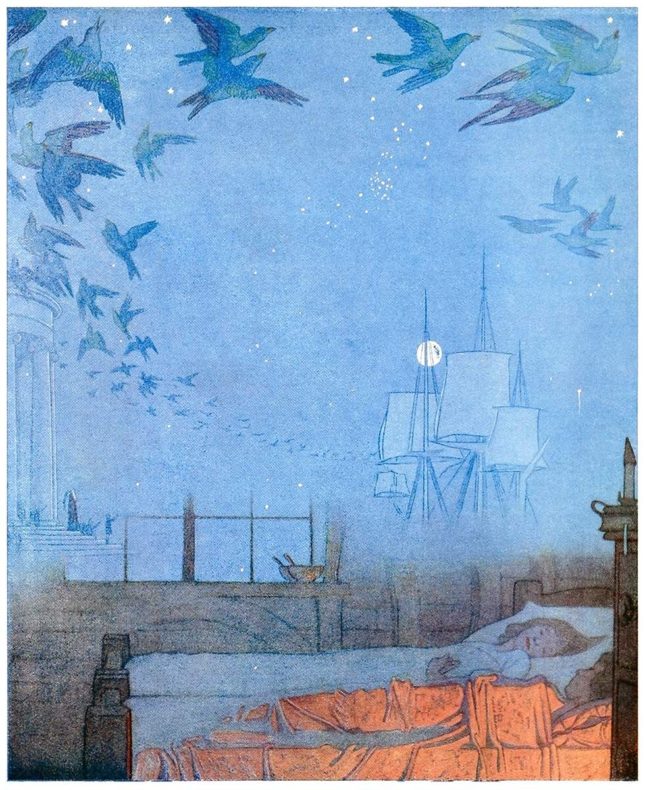
Different people wake up differently. My husband instantly transitions from a deep dark unconsciousness to crisp, bright alertness as if a switch has been flipped. I…do not.
For me, waking is a mysterious, confusing, and generally quite extended process, involving the gradual understanding that the reality I have been inhabiting for some time—years maybe?—is in fact a dreamworld of my own making.
At first I feel heavy, my body an unfamiliar and recalcitrant vessel I am pouring back into like honey. Biographical details swim into view. My name is Emma. I am married to—[checks notes]—this handsome guy in the bed next to me. I have two—two?—children and I am—wait, really?—40 years old. I live in this house. At this point I might attempt a some gross motor movement, maybe a wriggle deeper into the covers.
Next, I process my emotions. Sometimes apprehending my waking reality is a sweet relief. You mean I don’t have to go back to Roosevelt High School because I am missing a gym credit? Yay! I am not a spy in deep cover trapped on a long-haul spaceship about to be discovered by ruthless galactic counterespionage agents? Thank Christ for that!
But sometimes awakening to myself means saying goodbye to dream lives, dream lovers, dream worlds of great beauty. I often dream of a vast archipelago city, a kind of Seattle crossed with French Polynesia. I frequently have close encounters with whales or animal people. I fly, or find hidden rooms full of treasure. I’m not always ready to come home.
And then there is the matter of actually opening my eyes, focusing them, and summoning the strength and coordination to rise from a supine position and swing my feet to the floor. You may laugh, if you bound out of bed like my husband and son, like happy jackrabbits. Some mornings I have to gather my strength for half an hour before I attempt it.
Once upright, I am superficially ‘awake,’ but intimations of the sleeping world still swirl about like gauzy visions, blurring my sight and making me pause and cock my head, trying to catch departing dream thoughts by their tails. I won’t feel fully awake until after my first cup of coffee. And even then, a word or a pattern of light might at any point during the day cause the curtains between day and dreams to ruffle in the breeze, allowing irrational ideas and emotionally weird images to float through.
The first wobbly, fuzzy, uncertain phase of waking is called “sleep inertia,” defined in a 2000 review as “a period of transitory hypovigilance, confusion, disorientation of behavior and impaired cognitive and sensory-motor performance that immediately follows awakening.” Brain waves, cerebral blood flow, and other indicators do not snap from sleep to wake, but show characteristics of sleep states for up to half an hour after a person awakens. One study woke its unfortunate subjects with fire alarms and then forced them to play a video game. The researchers found that “decision-making performance was as little as 51% of optimum (i.e. baseline) during [the] first few minutes.” Extreme sleep inertia is a feature of some sleep and mood disorders and is often termed “sleep drunkenness,” which is not very fair to the sufferers, suggesting as it does that they have “overindulged” in sleep.
I hoped the scientific literature could shed some light on why I ooze into wakefulness and my husband just turns on like a lightbulb, but no such luck. As the 2000 review admits, “It is anecdotally well-known that individuals show a wide range of variation with respect to their perceived ability to function immediately after awakening. However, the literature on [sleep inertia] has definitely ignored this problem, relegating individual differences to a role of “confusing variable” to be controlled.” Confusing and variable describe my mornings pretty well, but this is not much help.
I found a study entitled “Caffeine Eliminates Psychomotor Vigilance Deficits from Sleep Inertia,” which, I mean, duh. I don’t drink coffee in the morning to stay awake longer; I drink it to wrench reality into clear focus and shoo away dream ghosts, to conclude the long interplanetary journey into the waking world.
A more recent study has one clue. It found that while early birds were able to shake off their sleep inertia after ten minutes, it took night owls like me half an hour to think clearly. So circadian “chronotype” has an effect.
Whatever the reason, I am not complaining. Sure, I can’t really make decisions or speak coherently right after I wake up. Mornings can be rough. But the jackrabbits make coffee for me. In truth, I love to linger in the strange phosphorescent waters of my ocean of dreams. And who knows, maybe it is more than just the sloshing of my cerebral fluid. I certainly feels more important and vaster than my one ordinary skull can contain.
Illustration by Frederick Cayley Robinson, 1920
When our daughter was a tot, she would sleep hard then wake up fully in seconds. Every morning, she woke, stood up in her crib, and positioned herself so she could see through the crack of the door into the hallway. As soon as she saw any movement, she’d say “Hi!” in the most cheerful voice imaginable. Many mornings I lay groggily in bed listening as she said “Hi!” whenever the cat walked by her door. And when, inevitably, I got up and walked into her room, her customary greeting would be accompanied by the broadest grin and outstretched arms. Who needs caffeine when you have that?
Who’s to say it’s not that the mental faculties that for you come online slowly when you rise don’t come on just as slowly for the ostensibly fast wakers, who rise later in the waking process and remain unconscious until all systems are go? Maybe slow waking is akin to sleep walking. Should we be calling it “wake sleeping”? No body is more eager to wake than mine, I could say.